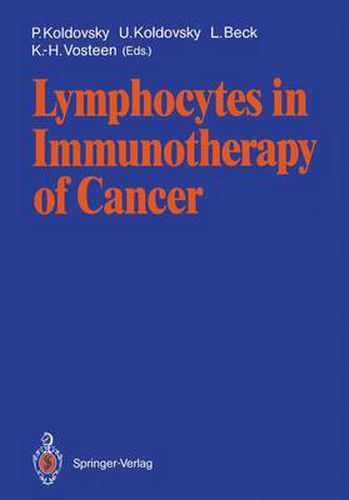Readings Newsletter
Become a Readings Member to make your shopping experience even easier.
Sign in or sign up for free!
You’re not far away from qualifying for FREE standard shipping within Australia
You’ve qualified for FREE standard shipping within Australia
The cart is loading…






This title is printed to order. This book may have been self-published. If so, we cannot guarantee the quality of the content. In the main most books will have gone through the editing process however some may not. We therefore suggest that you be aware of this before ordering this book. If in doubt check either the author or publisher’s details as we are unable to accept any returns unless they are faulty. Please contact us if you have any questions.
In the past, research in cancer immunology has produced informa tion important for other medical disciplines. It helped, for example, in formulating the laws of immunogenetics and in achieving a better understanding of the mechanism governing the fate of allotrans planted tissue. Cancer has often been considered a foreign body, and therefore many attempts have been made to cure it on the basis of the immunological principles applicable to parasitic, bacterial, or viral diseases. Vaccination has been investigated clinically for its po tential to prevent cancer [1], and clinical research into the cure of cancer has included active immunization [2], nonspecific stimulation of defense mechanisms [3], and transfer of passive immunity by cells [4] or by antibodies [5]. These experiments have been of limited value and in some cases have even had an adverse effect. The reputation of cancer immunology has suffered, and the concept has often been severely criticized. However, the basic postulate that cancer must originate from the body’s own cells, and that the immune system belongs to the principal regulatory mechanisms, remains valid. In recent years new research into clinical cancer immunotherapy has included critical appraisal of all its potential benefits, and also of the risks and limitations. It is dangerous to make unrealistic promises or to speak or think in terms of miracle weapons or a magic bul let.
$9.00 standard shipping within Australia
FREE standard shipping within Australia for orders over $100.00
Express & International shipping calculated at checkout
This title is printed to order. This book may have been self-published. If so, we cannot guarantee the quality of the content. In the main most books will have gone through the editing process however some may not. We therefore suggest that you be aware of this before ordering this book. If in doubt check either the author or publisher’s details as we are unable to accept any returns unless they are faulty. Please contact us if you have any questions.
In the past, research in cancer immunology has produced informa tion important for other medical disciplines. It helped, for example, in formulating the laws of immunogenetics and in achieving a better understanding of the mechanism governing the fate of allotrans planted tissue. Cancer has often been considered a foreign body, and therefore many attempts have been made to cure it on the basis of the immunological principles applicable to parasitic, bacterial, or viral diseases. Vaccination has been investigated clinically for its po tential to prevent cancer [1], and clinical research into the cure of cancer has included active immunization [2], nonspecific stimulation of defense mechanisms [3], and transfer of passive immunity by cells [4] or by antibodies [5]. These experiments have been of limited value and in some cases have even had an adverse effect. The reputation of cancer immunology has suffered, and the concept has often been severely criticized. However, the basic postulate that cancer must originate from the body’s own cells, and that the immune system belongs to the principal regulatory mechanisms, remains valid. In recent years new research into clinical cancer immunotherapy has included critical appraisal of all its potential benefits, and also of the risks and limitations. It is dangerous to make unrealistic promises or to speak or think in terms of miracle weapons or a magic bul let.